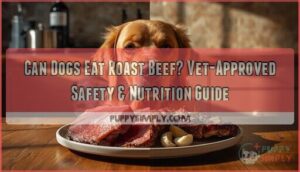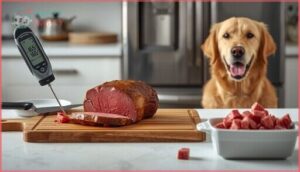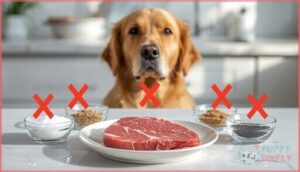This site is supported by our readers. We may earn a commission, at no cost to you, if you purchase through links.

Your dog’s eyes lock onto your Sunday dinner plate, tail wagging with hope as you slice into a perfectly cooked roast beef. You know dogs love meat, but the leftover seasonings, fat drippings, and that garlicky crust give you pause.
Plain roast beef itself isn’t toxic to dogs—in fact, it packs protein, B vitamins, and minerals that support muscle health and energy. The real danger lurks in what we add to it: garlic and onion seasonings damage red blood cells, excessive sodium strains essential organs, and fatty cuts can trigger painful digestive problems.
Understanding which version of roast beef is safe and how to prepare it properly means you can share this protein-rich treat without risking your dog’s health.
Table Of Contents
- Key Takeaways
- Can Dogs Eat Roast Beef Safely?
- Nutritional Value of Roast Beef for Dogs
- Health Benefits and Risks of Roast Beef
- How to Prepare Roast Beef for Dogs
- Alternatives and Veterinary Advice
- Frequently Asked Questions (FAQs)
- Can dogs eat Arby’s roast beef?
- Can dogs eat leftover roast?
- Can dogs eat roast beef with seasoning?
- Is roast beef suitable for puppies?
- How often can dogs eat roast beef?
- Can dogs eat roast beef with bones?
- Does roast beef affect dogs behavior?
- Are certain dog breeds allergic to beef?
- Can puppies safely eat roast beef?
- How often should dogs eat roast beef?
- Conclusion
Key Takeaways
- Plain, unseasoned roast beef is safe for dogs in moderation, but heavily seasoned versions with garlic, onion, or high sodium can cause red blood cell damage, kidney stress, and pancreatitis.
- Roast beef offers valuable protein, B vitamins, and minerals that support muscle health and energy, though its fat content requires careful portion control to prevent weight gain and digestive issues.
- Proper preparation means cooking beef to 165°F, trimming all visible fat, avoiding all seasonings and additives, and serving small portions based on your dog’s size—no more than 10% of daily calories.
- Watch for adverse reactions like itching, vomiting, or lethargy after feeding roast beef, and consult your veterinarian before introducing it to dogs with existing health conditions or food sensitivities.
Can Dogs Eat Roast Beef Safely?
The short answer is yes, dogs can eat roast beef, but the details matter more than you might think. Plain, unseasoned roast beef poses little risk to most dogs, while heavily seasoned or processed versions can cause serious problems.
If you’re wondering about other meats, dogs can safely eat steak following the same guidelines—cooked through and free of seasonings.
Let’s look at what makes roast beef safe or dangerous for your dog.
Is Roast Beef Toxic or Safe for Dogs?
Roast beef itself isn’t toxic to dogs, but it’s not entirely risk-free either. Plain, cooked beef can be a safe protein source when prepared carefully. However, the real danger lies in what comes with it—seasonings, fats, and additives that can harm your dog’s health.
Here’s what you need to know about roast beef risks and canine nutrition:
- Plain cooked roast beef offers safe protein for most dogs
- Garlic and onion seasonings create serious toxicity levels
- High sodium content stresses your dog’s kidneys and heart
- Beef allergies can trigger itching or digestive upset in sensitive dogs
- Fat-heavy cuts may lead to pancreatitis or weight gain
For more guidance on safe preparation guidelines, always serve roast beef plain, lean, and in small portions.
When considering meat safety for your dog diet, think plain and lean. Dog food alternatives like chicken or fish may suit dogs with beef allergies better.
Differences Between Plain and Seasoned Roast Beef
The key difference between plain and seasoned roast beef comes down to what’s added during cooking. Plain roast beef contains only beef and natural juices, while seasoned versions include salt, pepper, garlic, or onion powder that create toxicity risks for your dog.
| Roast Beef Types | Safety for Dogs |
|---|---|
| Plain, unseasoned | Safe in moderation |
| Seasoned with spices | Potentially harmful |
| Deli or cured | High sodium, avoid |
Choose plain every time.
For tips on low and slow roasting and identifying different beef roast cuts and methods, refer to expert cooking guides.
When is Roast Beef Unsafe for Dogs?
Even plain roast beef becomes unsafe when it contains toxic ingredients like onions or garlic, which damage red blood cells. High fat content can trigger pancreatitis, especially in smaller dogs or those with a history of digestive issues.
Before adding any condiments or seasonings, check which common toppings are toxic to dogs to keep your pet safe.
Roast beef turns dangerous when seasoned with onions or garlic, or when high fat content triggers pancreatitis in smaller dogs
Bone hazards from splintering, seasoning risks from salt overload, and allergic reactions round out the danger zones. Watch for symptoms of beef allergy or food poisoning after feeding.
Nutritional Value of Roast Beef for Dogs
Roast beef brings more to the table than just flavor when you’re thinking about sharing it with your dog. Understanding what’s actually in this protein-packed meat helps you make smarter choices about when and how much to offer.
Let’s break down the key nutrients you should know about, along with a few things that might give you pause.
Protein and Amino Acids in Roast Beef
Your dog’s body needs building blocks to stay strong, and roast beef delivers. A three-ounce serving packs roughly 22 to 26 grams of complete protein with all nine essential amino acids your pup requires for muscle growth and repair.
This amino acid profile includes leucine, which aids muscle recovery, while beef’s high protein digestibility means your dog absorbs these nutrients efficiently after every meal.
Vitamins and Minerals Provided
Beyond protein, roast beef offers vitamin B benefits your dog’s body relies on daily. Vitamin B12 promotes red blood cell formation and nerve function, while B6 aids protein metabolism and neurotransmitter production. Zinc contributes to healthy skin, immune defense, and brain function.
These vitamins work together to maintain nutritional balance, though they complement rather than replace complete dog food formulations.
Fat and Calorie Content Considerations
While roast beef delivers valuable protein, its fat content demands careful attention. Fat provides 9 calories per gram—more than double protein’s 4 calories—so a 3-ounce serving contributes 60 to 100 total calories depending on leanness.
Saturated fats can affect your dog’s weight and cardiovascular health over time, making moderation essential for balanced energy levels and nutrient density.
Health Benefits and Risks of Roast Beef
Roast beef can offer your dog some real nutritional perks, but it’s not without its downsides. Like most foods outside your dog’s regular diet, there’s a balance between what helps and what might hurt.
Let’s walk through the key benefits and risks you should know about before sharing this protein with your pup.
Positive Effects on Muscle and Energy
Lean roast beef delivers genuine advantages for your dog’s muscles and vitality when prepared correctly. The high-quality animal nutrition aids active dogs through essential amino acids that drive protein synthesis and muscle repair after physical activity.
- Muscle Repair: Amino acids rebuild muscle fibers damaged during exercise and play
- Energy Boost: B vitamins convert food into usable fuel for daily activities
- Athletic Performance: Iron improves oxygen delivery to working muscles
- Protein Synthesis: Leucine triggers muscle growth and recovery processes
- Nutrient Absorption: Fat-soluble vitamins support overall canine dietary needs
These benefits matter most when roast beef complements balanced Dog Nutrition and Health rather than replacing complete meals.
Potential Allergies and Food Sensitivities
Some dogs develop beef allergies or canine intolerances that make roast beef problematic for their pet health. Allergic reactions commonly appear as itchy skin, digestive upset, or ear infections within hours of eating beef.
Food allergies differ from sensitivities—true allergies involve immune responses, while intolerances affect gastrointestinal health without immune involvement.
Sensitivity tests and dietary restrictions help veterinarians identify beef allergy issues affecting your dog’s animal welfare.
Dangers of High Fat and Sodium
Fatty roast beef carries hidden dangers that can sneak up on your dog’s health. High fat and sodium levels work together to strain your dog’s body in several serious ways:
- Fat Intake Risks raise blood lipids, contributing to weight gain and cardiovascular stress
- Sodium Toxicity increases thirst, blood pressure, and kidney burden
- Cardio Issues emerge from combined fat-salt exposure affecting heart function
- Digestive Strains trigger vomiting, diarrhea, or pancreatitis in sensitive dogs
These nutrient imbalances demand careful portion control.
Hazards of Bones, Seasonings, and Additives
Beyond the fat and sodium concerns, the extras that come with roast beef pose serious threats. Bone fragmentation creates choking hazards and digestive issues, while toxic seasonings like garlic, onion, and excessive salt damage red blood cells and organs.
Additive risks from preservatives and flavor enhancers can trigger allergic reactions or stomach upset, making plain preparation absolutely essential for your dog’s safety.
How to Prepare Roast Beef for Dogs
If you’re planning to share roast beef with your dog, the way you prepare it matters just as much as the quality of the meat itself. A few simple steps can turn a regular cut of beef into a safe, nutritious treat your dog will love. Let’s walk through the essentials of cooking, seasoning, portioning, and storing roast beef for your canine companion.
Safe Cooking and Serving Methods
Proper cooking techniques and meat handling can make roast beef a safe treat for your dog. The right temperature control and serving guidelines protect your pet from harmful bacteria while preserving nutritional value.
- Heat roast beef to an internal temperature of at least 74°C (165°F) using a food thermometer to verify doneness and guarantee beef safety
- Trim all visible fat before cooking to reduce calories and prevent digestive upset
- Serve plain cooked roast beef immediately or refrigerate leftovers within two hours to maintain food safety for dogs
Importance of Avoiding Seasonings
Even the simplest seasonings can create serious problems for your dog. Salt and sodium blends stress the kidneys and raise blood pressure, while garlic and onion powders damage red blood cells and cause anemia. Harmful additives like MSG upset the stomach, and pepper irritates the digestive tract.
That’s why plain roast beef, free from all spice interactions and toxic ingredients, protects your pet’s health.
Recommended Portion Sizes by Dog Size
Once you’ve prepared plain roast beef, portion size becomes your next focus for safe feeding.
Small dogs under twenty pounds should receive no more than one or two small bites as a treat, while medium dogs between twenty and fifty pounds can have up to a tablespoon.
Large breeds over fifty pounds may enjoy up to two tablespoons, keeping total daily treats within ten percent of their calorie needs.
Storing and Handling Leftovers
After portioning, you’ll want to store any leftover roast beef safely to prevent spoilage. Cool the meat from 135°F to 70°F within two hours, then refrigerate at 41°F or below within the next four hours.
Use airtight containers, keep raw and cooked foods separate, and label with the date—leftovers stay fresh for three to four days.
Alternatives and Veterinary Advice
Roast beef isn’t the only protein that can work as an occasional treat for your dog. If you’re looking for alternatives or wondering when it’s time to get professional input, there are a few key things to keep in mind.
Let’s look at other protein choices, situations that call for veterinary guidance, and signs that roast beef mightn’t be agreeing with your pup.
Healthier Protein Options for Dogs
If your dog doesn’t tolerate roast beef well, you have plenty of healthier protein options. Lean proteins like skinless chicken breast or turkey offer complete amino acids with less fat. Novel meats such as venison, duck, or salmon work well for dogs with sensitivities.
You can also explore plant alternatives like quinoa or lentils. Protein rotation helps maintain balanced diets while supporting overall dog health and nutrition.
When to Consult a Veterinarian
Sometimes, even with careful preparation, you need professional guidance. Schedule vet visits when introducing roast beef to dogs with existing health conditions, or when you’re uncertain about appropriate portion sizes. Here’s when veterinary care is essential:
- Before dietary changes if your dog has diabetes, pancreatitis, or kidney disease
- When persistent digestive upset follows roast beef consumption
- If you notice unusual weight gain despite controlled portions
- To discuss vet-approved nutrition advice for senior dogs
- When emergency care signs like vomiting blood appear
Veterinary advice ensures pet health risks stay minimal.
Recognizing Adverse Reactions to Roast Beef
Watch for allergy symptoms like itching, hives, or swelling after your dog eats roast beef. Reaction signs such as vomiting, diarrhea, or abdominal pain indicate digestive issues that need attention.
Skin problems, wheezing, or lethargy may signal a beef allergy or toxic effects from seasonings. Food allergies in dogs can trigger pancreatitis, so follow veterinary advice and seek emergency care if symptoms worsen.
Frequently Asked Questions (FAQs)
Can dogs eat Arby’s roast beef?
Yes, in small amounts—but plain only. Arby’s roast beef contains high sodium and preservatives that can upset your dog’s stomach. Skip the seasonings, sauces, and buns entirely to protect your pet’s health.
Can dogs eat leftover roast?
You can share plain leftover roast with your dog if it’s unseasoned, cooled to room temperature, and refrigerated within two hours.
Trim excess fat, avoid bones and gravy, and offer only small portions.
Can dogs eat roast beef with seasoning?
Most seasonings on roast beef contain toxic ingredients like garlic and onion that pose serious seasoning risks, potentially causing hemolytic anemia.
Safe alternatives include plain, unseasoned beef that promotes proper canine nutrition without harmful additives.
Is roast beef suitable for puppies?
Plain, cooked roast beef is generally safe for puppies in small amounts, but you’ll want to choose lean cuts, remove all fat, avoid seasonings like garlic or salt, and watch closely for any digestive upset.
How often can dogs eat roast beef?
You should offer roast beef to your dogs as an occasional treat, not a daily staple.
Most vets recommend limiting frequency to once or twice weekly, keeping portions under 10 percent of total calories.
Can dogs eat roast beef with bones?
No, dogs shouldn’t eat roast beef with bones. Cooked bones splinter easily, creating choking hazards and risking mouth injuries or digestive blockages.
Raw bones pose bacterial contamination risks and potential internal damage despite seeming safer.
Does roast beef affect dogs behavior?
Roast beef can trigger behavioral shifts in dogs through digestive discomfort, allergies, or high fat content causing lethargy.
Energy changes, irritability from seasonings, and food sensitivities may also affect your dog’s mood and activity levels.
Are certain dog breeds allergic to beef?
Yes, certain breeds show genetic predisposition to beef allergies. Labrador Retrievers, West Highland White Terriers, and Cocker Spaniels develop breed-specific reactions more frequently, experiencing beef allergy symptoms like itching and digestive issues after consuming beef-containing foods.
Can puppies safely eat roast beef?
Puppies can enjoy small amounts of plain, fully cooked roast beef as an occasional treat, but you’ll want to skip any seasonings, trim the fat, and serve bite-sized pieces to support healthy canine digestion.
How often should dogs eat roast beef?
Think of roast beef like dessert—delicious, but not meant for every meal. You should offer it as an occasional treat only once or twice weekly, keeping portions small and always within your dog’s balanced diet framework.
Conclusion
Think of roast beef like a telegraph message—keep it plain and simple for safety. You can absolutely share roast beef with your dog, but only when it’s unseasoned, lean, and served in modest portions.
Skip the garlic, onions, and excess fat that turn a healthy protein into a health risk. When prepared correctly, this meat offers valuable nutrition without the dangerous side effects.
Your thoughtful preparation makes all the difference between a safe treat and a vet visit.
- https://www.akc.org/expert-advice/nutrition/human-foods-dogs-can-and-cant-eat/
- https://pangovet.com/talk-to-a-vet-online-dog-ate-drank-something/?utm_source=dogster&utm_medium=article&utm_campaign=dog_eat_drink&utm_content=can-dogs-eat-roast-beef
- https://fdc.nal.usda.gov/fdc-app.html
- https://www.petmd.com/dog/nutrition/fats-for-dogs
- https://avmajournals.avma.org/view/journals/javma/243/11/javma.243.11.1549.xml













